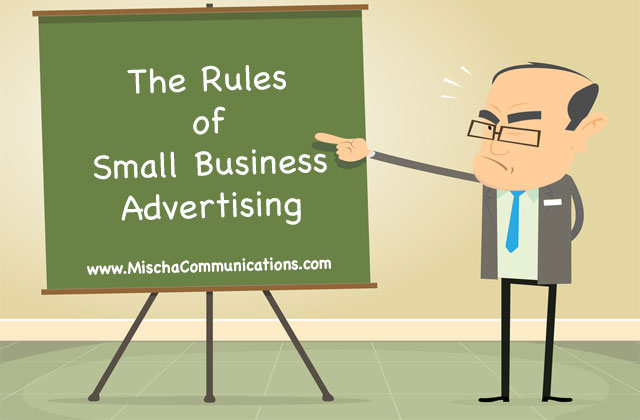Rules, rules, rules. No one likes to be told how to promote their small business, and on the whole, the world is your oyster as far as advertising is concerned. Still, there are a few pesky small business advertising laws you need to know about…and follow.
Don’t worry. We’ll make this as painless as possible.
The FTC oversees advertising, and it’s there to make sure your advertising campaign …
– Is truthful and non-deceptive;
– Only offers evidence-based claims; and
– Is fair in its claims.
Snake oil salesmen need not apply.
Advertising Laws for Online Businesses
Your small business website must abide by the same rules and regulations governing traditional advertising. Some thoughts on Internet marketing:
– Disclosures and disclaimers have to be clear.
– You have to deliver what you promise (product, tech service, money-back guarantee).
– Claims can’t be misleading.
In addition, any marketing or advertising agency you choose to use (like Mischa!) is responsible for reviewing your claims.
Marketing to Children
If you’ve developed the next amazing yo-yo that shoots Skittles and doubles as a video game controller, you’ll probably need to learn the FTC’s rules about marketing to children:
– You can’t exploit their inexperience.
– You can’t directly tell them to persuade their parents to buy the product.
– You can’t show minors in unreasonably dangerous situations.
Other regulations govern product placement, television commercials and marketing violent entertainment to children (links to a PDF).
Testimonials
Having a Hollywood A-lister endorse your product is a big deal – as long as they’ve actually tried it. The rules about endorsements and testimonials are pretty clear-cut/
– If you pay someone for an endorsement, you must make that clear in the ad.
– Never, ever use someone’s name without his or her permission.
– Disclose any pre-existing relationship between the endorser and your company.
The Consequences of Breaking the Rules
Noncompliance with the FTC is a big deal. If you’re caught on the wrong side of the advertising law, you can be the proud new owner of an official cease and desist order, which can cost you up to $16,000 for each violation. Your consumers may file a class-action suit requiring refunds, damages and a costly legal team. Violations of some FTC rules can even land you in a federal courtroom facing criminal charges.
We don’t want that to happen. Know the rules and stick to them. If you’re still confused, contact Mischa Communications. We speak legalese and gobbledygook. We can translate.
